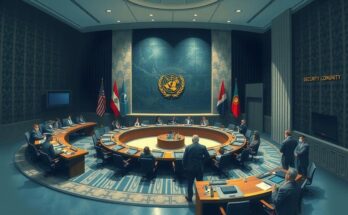The UN highlighted the necessity of a transitional justice policy for Syria, emphasizing victim involvement in addressing over 130,000 missing persons. Advocates call for global attention to transitional justice, as discussions emphasize youth engagement and the importance of addressing historical crimes. UN officials warn of the threats to international laws protecting humanity from atrocities, insisting on the need for collective moral responsibility.
On Wednesday, the plight of the Syrian people in their quest for peace was highlighted at the UN, where Yasmen Almashan, a leading advocate for families of forcibly disappeared individuals, shared her enduring anguish over the loss of five brothers during the Syrian civil war. Almashan emphasized the necessity of establishing a national transitional justice policy to uncover the fate of over 130,000 missing persons. She pointed out that the engagement of victims is crucial for the success of transitional justice initiatives and the promotion of human rights in Syria.
Reflecting on past actions, Almashan noted that a decade ago, the Assad regime had obstructed an exhibition showcasing the harrowing Caesar Files, which contained photographic evidence of torture in Syrian prisons. This advocacy from Syrian NGOs contributed to the UN General Assembly adopting Resolution 77/301 in June 2023, which calls for the creation of the Independent Institution for the Missing in Syria and emphasizes victim involvement in its work.
UN Human Rights Chief Volker Türk endorsed the renewed focus on transitional justice, praising Member States’ initiatives to confront historical atrocities for the benefit of future generations. He cited Guatemala’s progress where victim-led efforts have resulted in convictions for crimes against humanity, along with Colombia’s restorative strategies aimed at rebuilding societal ties post-civil conflict.
In addition, Türk highlighted the need for an inclusive approach to transitional justice that is centered on victims and responsive to gender issues. He referenced recent successes in Kenya, where survivors of sexual violence have mobilized for reparations, and in Chad, where reparative measures have been implemented, thanks to civil society’s diligence.
Sofija Todorovic, representing the Serbian NGO Youth Initiative for Human Rights, underscored the crucial role of youth in shaping a just future. She urged the necessity of equipping young people with the tools required to navigate their pathways forward while stressing society’s responsibility to support their efforts.
During the meeting, UN Human Rights Deputy Chief Nada Al-Nashif alerted Member States about the increasing threat to international laws designed to protect humanity from atrocities. Al-Nashif underscored the alarming nature of contemporary conflicts, highlighting that genocide often stems from blatant discrimination, exclusion, and incitement to hatred.
She warned that global norms, including the United Nations Charter and the Universal Declaration of Human Rights, face unprecedented challenges. Al-Nashif reiterated that genocide occurs when moral failings allow hateful ideologies to flourish, asserting the need for collective action to establish a society where such crimes are unthinkable and accountable.
The discussions at the UN regarding Syria reflect a profound need for transitional justice, underscoring the importance of victim participation in shaping a peaceful future. Advocates like Yasmen Almashan are instrumental in pursuing the truth for the thousands of missing individuals. The broader themes of inclusivity and youth engagement in transitional justice showcased the importance of addressing past wrongs to prevent future atrocities. Continued vigilance against the threats to global norms is essential to uphold human rights and prevent genocides going forward.
Original Source: www.miragenews.com




